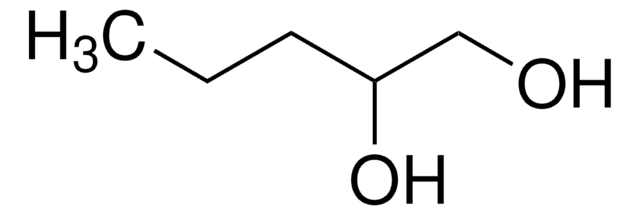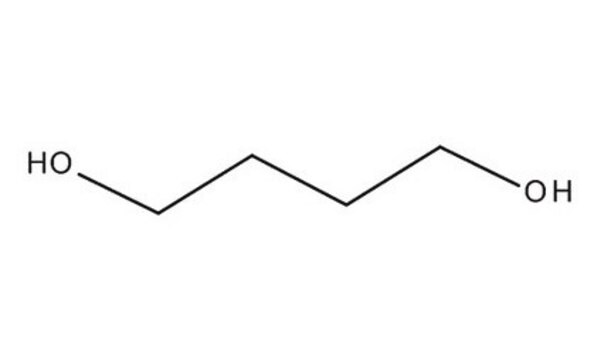8.07061
1,5-Pentanediol
for synthesis
Synonyme(s) :
1,5-Pentanediol, Pentamethylene glycol
About This Item
Produits recommandés
Pression de vapeur
>0.01 hPa ( 20 °C)
Niveau de qualité
Pureté
≥97.0% (GC)
Forme
liquid
Température d'inflammation spontanée
330 °C
Puissance
10000 mg/kg LD50, oral (Rat)
>19800 mg/kg LD50, skin (Rabbit)
Limite d'explosivité
1.3-13.1 % (v/v)
pH
7.5 ( in H2O)
Point d'ébullition
240-242 °C/1013 hPa
Pf
-16 °C
Température de transition
flash point 136 °C
Densité
0.99 g/cm3 at 20 °C
Température de stockage
2-30°C
InChI
1S/C5H12O2/c6-4-2-1-3-5-7/h6-7H,1-5H2
Clé InChI
ALQSHHUCVQOPAS-UHFFFAOYSA-N
Application
- Biodegradable Polymers for Sustainable Packaging: A study on biobased multiblock copolymers incorporating 1,5-Pentanediol for sustainable food packaging explores the use of poly(l-lactic acid) and 2,5-furandicarboxylic acid, offering insights into composting kinetics and mechanisms (Bianchi et al., 2023).
- High-Temperature Battery Applications: Research on working aqueous Zn metal batteries at 100°C examined the role of 1,5-Pentanediol in stabilizing electrolyte solutions, highlighting its utility in high-performance energy storage systems (Wang et al., 2022).
- Biopolymer Synthesis for Environmental Sustainability: Engineered Halomonas bluephagenesis synthesizes diverse α,ψ-diol-derived polyhydroxyalkanoates, utilizing 1,5-Pentanediol, to create plastics with improved biodegradability and performance in environmental applications (Yan et al., 2022).
- Advanced Materials with Barrier Properties: A study on renewable furfural-based polyesters containing 1,5-Pentanediol reports high oxygen barrier properties, suitable for packaging applications that require extended shelf life and sustainability (Ahmed et al., 2022).
Remarque sur l'analyse
Density (d 20 °C/ 4 °C): 0.988 - 0.991
Identity (IR): passes test
Code de la classe de stockage
10 - Combustible liquids
Classe de danger pour l'eau (WGK)
WGK 1
Point d'éclair (°F)
287.6 °F - closed cup
Point d'éclair (°C)
142 °C - closed cup
Certificats d'analyse (COA)
Recherchez un Certificats d'analyse (COA) en saisissant le numéro de lot du produit. Les numéros de lot figurent sur l'étiquette du produit après les mots "Lot" ou "Batch".
Déjà en possession de ce produit ?
Retrouvez la documentation relative aux produits que vous avez récemment achetés dans la Bibliothèque de documents.
Les clients ont également consulté
Notre équipe de scientifiques dispose d'une expérience dans tous les secteurs de la recherche, notamment en sciences de la vie, science des matériaux, synthèse chimique, chromatographie, analyse et dans de nombreux autres domaines..
Contacter notre Service technique








